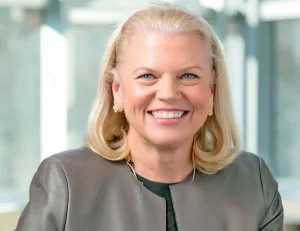Ginni Rometty, former IBM boss
It was a Man’s World — but it‘Wouldn’t be Nothing’ Without A Woman like Ginni Rometty…
‘Teaching, hiring and advancing women benefits us all,’ says female tech pioneer
Virginia “Ginni” Rometty is, in no uncertain terms, a trailblazer of the tech world.

Ginni Rometty
She was the first female CEO of American multinational IBM, a corporation with a presence in 175 countries. She shepherded the tech giant through trying times, and established it as a major player in cloud computing.
But Rometty’s reign has not been without controversy. She came in for criticism over the delivery of generous executive bonuses — despite 24 consecutive quarters of declining revenue. She has spoken about her struggles and triumphs in a book entitled Good Power: Leading Positive Change in Our Lives, Work, and World.
Rometty studied computer science and electrical engineering at Northwestern University in Illinois. She received a scholarship from General Motors and completed an internship there during her undergraduate studies.
And while she was a pioneer herself, Rometty was also following the footsteps of some female greats of the computer science world — although their names have often been lost to history.
Lady Ada Lovelace is regarded as the first coder in history. She wrote an algorithm in 1833 for a proposed mechanical general-purpose computer designed by English mathematician and computer pioneer Charles Babbage. He never managed to complete his creation, known as the analytical engine — so Lovelace was never able to execute her code. Women contributed greatly to the early days of computing, particularly as codebreakers in World War II, and went on to take roles as data-crunchers in the space race.
In the 1960s, women made up the bulk of the computing workforce, but by 1970, they represented just 13.6 percent of US computer science graduates. Women held 37 percent of the bachelors’ degrees in computer science in 1984; by 2021, that figure had dropped to 18 percent.
Coming into this changing playing field, Ginni Rometty graduated in 1979 and joined General Motors Institute as the head of application and systems development. She went on to become a systems analyst and engineer at IBM in 1981, mastering technical and management positions as she advanced through the ranks. She had staying power, and after three decades with the company, she was appointed as IBM president and CEO in 2012.
Successes and Challenges
Rometty took the helm at a moment of pivotal transformation for century-old IBM. The tech giant has a history of changing leadership during periods of revitalisation, and there was no pandering to her gender. Samuel Palmisano, IBM’s CEO from 2002 to 2011, told The New York Times: “Ginni got it because she deserved it. It’s got zero to do with progressive social policies.”
She steered the company away from low-margin ventures — including parts of its traditional hardware business lines — and focused on rapid-growth opportunities in data analytics and cloud computing.
“What steam was to the 18th Century, electricity to the 19th and hydrocarbons to the 20th, data will be to the 21st Century,” Rometty predicted in 2015. “That’s why I call data a new natural resource.”
The firebrand brokered partnerships with Apple, SAP, and Twitter. She oversaw the divestment of nearly $10bn in annual revenue — and the creation of a $21bn hybrid-cloud business. One of Rometty’s most notable accomplishments was the $34bn purchase of Red Hat, an open-source software provider, in 2018. That deal, the largest acquisition in the company’s history, continues to support the expansion into cloud computing. “We’re transforming this company for the next decade,” Rometty said in a 2014 interview with CNBC. “That is not a one-year job Not when you’re a hundred-billion-dollar company.”
The company was entering an era of converging tech trends: AI, big data, mobility, cloud computing and social networking. “Unlike any time in history, you had four or five trends all going at once,” she recalls, “feeding on each other and accelerating.”
During her eight-year tenure, IBM spent more than $133bn on deals, R&D, and capital expenditure, including 68 acquisitions. It wasn’t all smooth sailing; Rometty faced criticism over dwindling sales and a stagnant share price. To reduce costs and boost revenues, in 2014, IBM fired thousands of workers. Rometty defended the layoffs as necessary corporate restructuring. She received a $3.6m bonus for her performance in 2014, despite declining revenues. The compensation she received for her last two years on the job — with revenue and share price still in the doldrums — was a cool $41m.
Her recent memoir, Good Power: Leading Positive Change in Our Lives, Work, and World, contains some relevant snippets of information about that era. “Our challenge was to find that balance between being in service of our existing clients and surviving as a business,” Rometty wrote. “Who is IBM now? What should we become?”
Regarding IBM’s divested assets during her tenure, she says: “I did all this knowing that it meant no growth for the company at a time when the investment world was clamouring for it.” She defends her actions as the “right long-term choices”.
Rometty passed the company reins to Arvind Krishna in April 2020, naming him the “the right CEO for the next era”. Krishna started his IBM career in 1990 and worked his way up to lead the cloud and cognitive software division. “He’s a brilliant technologist who has played a significant role in developing our key technologies such as AI, cloud, quantum computing and blockchain.”
Rometty has been an advocate for diversity and inclusion throughout her career. She spearheaded campaigns to bring more women and people of colour into senior roles at IBM. In 2016, she launched IBM’s “New Collar” recruitment programme, which aimed to give training and employment options to employees lacking college degrees. She believes employers could recruit more efficiently, and achieve more diversity, by focusing on candidates’ skills and learning capacity, rather than insisting on university qualifications.
IBM worked with schools in low-income areas to provide students with mentorship opportunities and potential employment. Rometty implemented a SkillsFirst initiative to create on-ramps for people who had been previously overlooked. She struggled against biased notions that the move would dumb-down the workforce — and proved herself right.
“We did a lot of studying of the results, and the net of that was, nope, after about one year, their results were actually equivalent to our degreed people,” Rometty told the Harvard Business Review. “And by the way, they actually took more education; they were thirstier.” She also found that hirings were more diverse. “At first we called them ‘new collar’,” she says. “Not white collar, not blue collar: something new.”
IBM continues to support Rometty’s skills-first vision through its Pathways in Technology Early College High Schools, or P‑TECHs. The collaborative educational reform programmes provide schools with support, resources and mentorship to prepare students for modern tech jobs. Upon graduation of the six-year programme, students have earned a high school diploma and a two-year postsecondary degree in a STEM field — at no cost. Today, the P-TECH programme serves hundreds of thousands of students in hundreds of schools in 28 countries.
Rometty believes this culture is crucial in technology fields, where upskilling is required every two or three years. “You have to be willing to reinvent yourself,” Rometty told the Financial Times. “If you don’t define who you are, someone else will.”
Rometty continues to advocate for skills-first job recruitment in her role as co-chair of the executive committee of OneTen, a coalition helping black job-seekers connect with opportunities that don’t require university education. It provides wrap-around support services and connects the talent pool to educational and skill-building organisations.
The former exec is currently promoting her book, in which she reflects the journey from childhood poverty to the C-suite of a Fortune-500 company. It taught her that, to paraphrase the old song, “it ain’t what you do, it’s the way that you do it”.
Conflict resolution is a recurring topic in the book. “There are different ways to run toward conflict,” she explained. “One is to protest, take a stand, and be very vocal. That doesn’t always mean public or private. I think it means keeping your eye on what you’re really trying to get done, and what [provides] the best odds of that happening.
“Whenever you position something so that there’s going to be a winner and a loser, very rarely have I seen that be to anybody’s benefit. If you position something so that there is no way out other than making the other person look like a loser, you’re not going to get done what you have to get done.”
Ginni Rometty has faced numerous difficulties and considerable changes. She has earned a reputation as a problem solver, risk taker and forward thinker. She oversaw the company’s transition into fast-growing industries such as cloud computing, AI, blockchain and cybersecurity.
Rometty serves as a role model for girls interested in STEM subjects and women interested in executive leadership. Her exit from IBM coincides with a general exodus of female leaders: Susan Wojcicki has stepped down from YouTube, Meta Platforms lost its chief business officer, Marne Levine, and Sheryl Sandberg left her role as Meta’s COO.
“During my time at IBM, our P-TECH programme and changes to our recruitment process brought more diversity, including more women, into our workforce,” Rometty told the Economist. “Other companies should follow suit — businesses that include a variety of perspectives and experiences are more innovative, more competitive and more able to create products that appeal to a whole host of users.
“Giving everyone equal access to education and employment opportunities also promotes women’s economic security — and so will help societies flourish.
“When it comes to science and tech careers, women must not be discouraged, overlooked, or derailed. They must also be paid equally. Teaching, hiring and advancing women benefits us all.”
You may have an interest in also reading…
Conservation Efforts Working in Harmony with Economic Growth
The Environment Agency – Abu Dhabi maintains its focus on conservation, species reintroduction, monitoring and protecting marine and air quality,
ARTICO Partners: Combining Investment Performance, Sustainability and Climate Objectives
“ARTICO Partners’ policy has always been to invest in companies that are fundamentally good,” says CEO Gabriel Herrera. “Over time,
Rainmaker: Revolutionary Water Supply Solutions That Are Needed Now More Than Ever
Across our entire planet, less than three percent of water is fresh. Of this, only 0.5 percent is accessible —


















































































